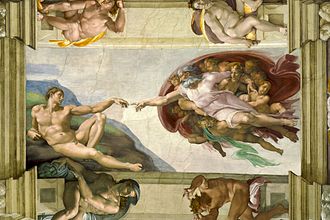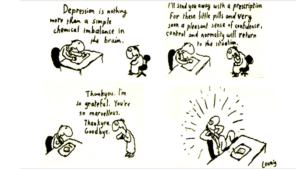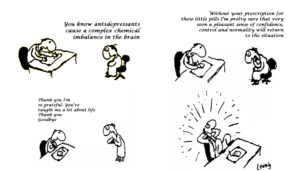
This post continues Zen and Psychopharmacology and An Archipelago of Realities.
I am going to rewrite a rewrite of Genesis. Here is the rewrite to be rewritten:
The six days of Creation were divine and bright. But on the seventh day God broke down. On the seventh day he felt the unknown texture under his fingers and frightened he withdrew his hands from the world.
In this rewrite David, Dee, Kal, Joanna, Nancy and others who were involved in creating RxISK and TAPERx are at risk of a God complex.
Tullio and an increasing number of close friends engaging with Buddhism or Zen – An Archipelago of Realities – seeking enlightenment are similarly at risk.
Many doctors attempting to restore the original creation when our health or mental health goes wrong have already succumbed.
Many psychologists doing clinical research or therapy are at risk as was the German philosopher Martin Heidegger – as has been pointed out by Don Marks. Don, who is the editor of Ethical Human Psychology and Psychiatry, wrote a great chapter – Questioning Clinical Technologies: Psychotherapy after Martin Heidegger, Technology and Psychotherapy – in Practical Alternatives to the Psychiatric Model of Mental Illness .
In the 1940s and 50s, Heidegger’s writings captured ideas about technology and its power to alienate us that many pay homage to without delving into. The reason given for not delving is ‘his links to the Nazis were unfortunate’.
The real reason is his writing is difficult and in German. The ideas are not difficult. It’s MH. He was intensely neologistic – he invents his own words. Even if fluent in German, you’d likely need a translation into something understandable. Don has done a fabulous job on this.
MH outlines how we created technology which then semi-automatically proceeds to create stuff all around it – including a version of us. Rather like Genesis where good turns to evil, get too close to technology and it makes objects of us that can be slotted into processes just as anything else can. It dehumanizes us.
Technology is a globalizing force that has infected healthcare, transforming it into health services. These services aim at remaking us in the same way a robot might remake a faulty gadget, or maybe make it more mindlessly efficient (i.e. improve it). Clinical psychologists and psychiatrists semi-automatically, algorithmically, apply demonstrably effective processes when we bring something broken to them. They no more see the person that is us than a robot would. Even their have-a-nice-day is increasingly likely to be programmed.
Painting himself into a corner, from which he could see no ready way out, MH crossed his fingers and jumped. Perhaps the creative act can save us, he said. Our creativity gives rise to technologies, but it also gives rise to poetry and art. If we can bring this other creative act into play, it might save us.
In support of this escape route, Heidegger quotes Holderlin – a German romantic poet who went mad.
Bringing the creativity that leads to poetry to bear on clinical encounters is a beautiful thought but claiming I was doing poetry with you is unlikely to be much of a legal defense if I fail to get you well or perhaps harm you by entertaining fantasies about abuse on alien spaceships when you were a child – The Great Silence – or if I do not warn you about the harms a drug I gave you was likely to trigger.
Bruno Schulz
The rewritten creation narrative above has a central place in Shipwreck of the Singular. It was used ‘poetically’ to convey just how badly the creation of randomized controlled trials (RCTs) and evidence based medicine (EBM) technologies had distorted medicine and health care.
This rewrite of Genesis comes from Bruno Schulz. Schulz is usually called a Polish Jew, but he lived in what was then and is now part of Ukraine. His The Street of Crocodiles and Sanatorium under the Sign of the Hourglass are extraordinary books. His life ended in a stranger than fiction way – out of the blue in November 1942 he was shot on the street as a semi-joke by a German soldier.
Bruno’s books are highly and idiosyncratically creative, a magical realism before Marquez reinvented it. His rewrite of Genesis had one more marvelous sentence that I left out of the version above:
The six days of Creation were divine and bright. But on the seventh day God broke down. On the seventh day he felt the unknown texture under his fingers and frightened he withdrew his hands from the world. Beware the seventh day.
You can guess without me telling you that for Bruno the world was a strange and mysterious place. You may also sense or won’t be surprised that those who knew him speculated on whether he was describing his father’s difficulties in making sense of the world around them.
The God Complex
There is an artistic logic in Bruno’s rewrite, which I am now replacing:
The six days of Creation were divine and bright. But on the seventh day God broke down. On the seventh day he felt the unknown texture under his fingers and frightened he withdrew his hands from the world. Embrace the seventh day.
‘Embracing the seventh day’ – captures a logic or light of science that the darkness of technology cannot comprehend – there are deliberate echoes in this sentence.
Is mentioning the light of science an attempt to make science sound more appealing than it is? Can it be as romantic as poetry? Can the science that gives rise to technology save us from technology? Surely poetry is a better bet.
It depends on what you mean by science. For many science is the road to objectivity, something as treasured as enlightenment is for Buddhists or the European Enlightenment was to philosophers and many states, like France, and parties on the Left who aspire to the universality the Enlightenment promoted.
But objectivity like this, and Zen enlightenment or philosophical Enlightenment are dreams, perhaps even nightmares. They trap us in a myth. They push us back into a childhood where we can believe in and depend on a God, or expert, or some father figure who has the answers or at least the right processes – aka algorithms.
This kind of objectivity or enlightenment doesn’t just trap those of us who might want help, they trap the expert, who is offering help. Whether it’s a Freud, a Beck, a Doctor practicing Evidence Based Medicine, or a Zen Master, the person we seek help from is trapped by an idea of expertise that has retreated from the world.
Perfect objectivity or enlightenment is a dream. We live and die in this world on the basis of the risks we take. We can dream about being rational but as Bruno found out when shot on the street the world never shares our dreams.
The temptation to zazen (sit) and meditate, to rise above our materiality, to sail through life without engaging with the world, without suffering from the illusions our egos generate, is strong. The temptation to believe that science aims at a universal objectivity is strong. The increasing efficiency of technology might seem to cement that idea in place even as it threatens to replace humans.
The Meaning of Us
Around the time Bruno was being shot on the street, George Oppen, a 34 year old poet, with a military deferment (escape clause) was signing up to fight in Europe. In the Battle of the Bulge, he “stood in emplacements, in mess tents, in hospitals and sheds, and hid in the gullies on blasted roads in a ruined country beside many men more capable than I, Muykut and a sergeant named Healy…” His unit liberated the Landsberg am Lech concentration camp. He got a Purple Heart for bravery – not bad for a poet?
His shortest poem is Semantic:
There is that one word
Which one must
Define for oneself, the word
Us
We came into this world as a mammalian species. Neither your, nor my, endocrine systems are your’s or mine alone – they are ours. They are shaped by those around us. Our brains and bodies are social through and through.
The species has evolved to have a range of skills – to have risk takers (extraverts) and risk managers (introverts) – in its midst as well as variation on a host of other dimensions. Successful groups balance these skills just as individual bodies balance variation.
I might have a sky high cholesterol level but in the absence of other risk factors, this is likely to be fine for me or at least better than attempting to conform my cholesterol to some average with a statin without having any idea what the attempt to get me to conform might do to other things in my body that operate on the basis of my cholesterol level as it is.
The use of scales to measure human weights in France in the 1860s led a decade later to the emergence of a new mental illness – Anorexia Nervosa. The ability of numbers to capture our attention can be dangerous. If we cannot measure everything, we should not assume we know what any measurement means. A set of figures without context has little meaning.
When a context is imposed on the figures we risk disaster. The Dashboard Nervosa that almost all of us developed during the Covid pandemic is an extraordinary illustration of this. With what consequences, we still don’t know.
In an acute medical emergency, happening in a treatment naïve case, a balance has been thrown out of whack and an intervention may be needed. But very little of what happens in healthcare falls under this heading.
If someone comes to us with a problem, or more usually now if the service we work for reaches out to screen them and give them problems, the physiological or psychometric tests we do are a snare. They might seem to promise something useful that, among other harms, risks leaving the person who comes to us believing in our expertise. Might leave them inclined to delegate their narcissism to us – something few of us on the receiving end can resist – as the Leunig cartoon above brings home.
But, even in the case of a life-threatening event such as when a person has just escaped a serious overdose, the story they tell is likely to be the single most effective intervention. If they are let listen to themselves tell their story, perhaps helped by sensing where I don’t understand what they are saying, they are more likely to reframe their story in a way that will be more helpful than anything I might say about how they ‘should’ be thinking or viewing things.
The key skill I can bring to bear on this lies in being able to let them tell their story even when it contains a profound rejection of all I stand for. Attempting to shoehorn their story into a service template is not the way forward – nor is it scientific even ifI bedeck it with procedures that look scientific and objective.
The Stone the Builders Rejected
The alienation, the evil MH was concerned about, can today be most clearly seen when someone returns to a health system wondering if their treatment has caused an adverse effect.
There is an almost complete denial that our pharmaceutical sacraments actually cause problems. (We concede the possibility in principle). The MMJs (Medical Misinformation Journals) deny problems actually happen. The Commandments (Guidelines) healthcare providers are expected to follow don’t mention adverse effects. Clinical psychologists and others in health services, turn a blind eye to and say nothing about problems right in front of them that increasingly shape the presentations of the people they see.
Beyond those working in health services, their journals and professional associations, Governments, bureaucracies, religious leaders like the Pope, all effectively deny that adverse events happen.
The science and enlightenment seems to be on one side, the person claiming that Xtianity, Zen, the latest drug or therapy doesn’t work for them is on the other. A few of us might reach down, feel the unknown texture, but we take fright and withdraw, leaving the afflicted to support each other.
Zen and Psychopharmacology gives this a Bruno Schulz like spin. Both mindfulness and psychedelics are being commodified to fit the market – to limit rather than expand our sense of the possible. One dose of a non-commodified psychedelic can transform a severe depression – see Healy Ketamine. One person who responded this way when asked about prior delusional beliefs said they were still there but “before they were bigger than me, now I am bigger than them”.
Until the 1990s, medicine was bigger than the pharmaceuticals it used. Now they are bigger than it. We need to find a way to shrink the delusions back to a manageable size.
In 1991, prompted by a Lilly article in the BMJ – Vampire Medicine – medicine handed its birthright over to an averaging machine (RCTs and EBM). You’d have thought the argument that – because men on average don’t murder their wives, this man, who obviously did murder his wife, didn’t – would be easy to reject. But medicine swallowed badly compromising medical care and the possibility of justice at the same time.
The adverse effects of drugs offer the best example of how far we have strayed from a scientific or enlightened course. These stones, that we the builders are rejecting, are the cornerstone of science and enlightenment. Embracing them is central to our humanity.
Our supposed science comes from a set of averaging machines that obliterate variation. Most of what these machines churn out are aimed at securing markets and making money rather than helping me to help you or you me. These marketing claims are made in ghost-written publications with no-one having access to the data behind the claims. Our systems behave like these claims are Holy Writ, even though many insiders know the claims to be fraudulent.
This is not a matter of evil in the sense of corruption. It’s evil in the sense of us allowing an averaging machine that churns out uni-dimensional numbers to replace the rich complexity that is a person and even richer complexity that is a group of us.
The averaging machines are morally neutral. The evil lies in our bowing down to them rather than using what they can provide to do good. Meeting someone obviously harmed by a treatment is the moment that should remind us of this.
Science is not about I think or calculate and therefore I am, Cogito ergo Sum, it is about we come to consensus decisions therefore we are – Decernimus ergo Summus.
There is a personally painful example of this in the current RxISK posts on Potentially Inappropriate Deprescribing (PID) and Responsibility for Deprescribing. Reducing Medication Burdens is perhaps the most important task in medicine today. Many of the people who see this, however, are at great risk of doing more harm than good by failing to see the predicament of some people on whom they inflict their good intentions.
We are fooled by the generalities of averages. These are not the universality science aims at. From genes, to stars to us, science aims at individuality. It is not content with the orange glow of galaxies it wants to make out the individual stars. It is not content with a species, it wants to map out all the variation in that species.
Following generalities is religious rather than scientific. While religious propaganda sells the idea of truth and enlightenment, usually framed in terms of Holiness or spirituality, in practice religions have always been primarily about keeping the herd together rather than seeking truth.
The irony in our day is that bowing down to the averaging machines has generated a rush to replace Holiness with Health – see Zen and the Art of Psychopharmacology.
Another irony is that the deprescribing posts mentioned above are a great example of Gandhi’s warning – He who would do a Great Evil, must first of all persuade himself He is doing a Great Good.
Did Heidegger turn to poetry because it has no consequences? Is poetry appealing in this context because it has no consequences? Real science and enlightenment requires courage. Can a cowardly enlightenment ever be true? Can a medicine that has lost its moral compass ever be viewed as a Healing Profession?
From Galileo on, science has required courage. Being courageous is not now appealing to anyone in healthcare. How is it morally, scientifically, philosophically or religiously possible to tolerate a ghost-written medical literature, or lack of access to study data, and to be silenced in the face of people being harmed and dying as a result of our silence?
Science happens when people with different views about something they can both observe attempt to come to a consensus. A coherent logical structure doesn’t mean something is science. Graphs that look scientific aren’t science. Appealing to a Bible or Scientific publications is not science.
We don’t just fail someone when we fail to see or listen to them telling us our solution doesn’t work for them – we fail ourselves also and we fail everyone else seeking help from others and not just from us.
In recent talks and posts – Healthcare Gone Mad – I’ve pointed to a podcast by Roy Whaley, Bryn Shortland and Simon Wright dealing with this. It is a remarkable testimony about the growing vacuum at the heart of modern health services. Who are these philosophers? Three ordinary guys that the system wants to pretend do not exist.
Genesis
In the original Creation narrative Good triumphs over Evil. Evil is an absence of Good – as in technology which is morally neutral. It takes Us to bring Good out of this Evil. Do we?
George Oppen framed the question for us:
Sarah, little seed,
Little, violent, diligent seed. Come let us look at the world
Glittering: this seed will speak,
Max, words! There will be no other words in the world
But those our children speak. What will she make a world
Do you suppose, Max, of which she is made?





A friend sent this snippet from The Way of Chuang Tzu
There were three friends Discussing life
One said:
Can men live together
and know nothing of it?
Can men work together
and produce nothing?
Can they rush around
and forget to exist?
The three friends looked at each other
and burst out laughing.
They had no explanation
but were better friends than before.
Then one friend died.
Confucius sent a disciple
to help the other two chant his obsequies
The disciple found one had composed a song
while the other played a lute.
They sang:
Hey Sung Hu, where’d you go?
Hey Sung Hu, where’d you go?
You have gone where you really were
and we are here.
Drat, we are here.
The disciple of Confucius burst in and said,
Where did you find this in the rubrics for the obsequies?
This frivolous carolling in the presence of the departed.
The two friends looked at each and laughed.
“Poor fellow, he doesn’t know the new liturgy”
Attempting to shoehorn their story into a service template is not the way forward – nor is it scientific even ifI bedeck it with procedures that look scientific and objective.
BMJ’s lawyers made it clear that if the journal had anything to do with Healy and Jureidini they would be providing GSK or other companies with grounds to claim bias and to sue. This is even though BMJ and GSK are partners in AllTrials and BMJ had a short while before featured Andrew Witty on its front cover as the acceptable face of pharma, helping GSK put a $3 billion fine behind them. Partnership?
BMJ is a business that can no longer support medical practice, a key part of which is describing harms. If a doctor is not prepared to go to Court to stand up for the harms she’s put her name to, she’s writing fiction – a bit like Bram Stoker saying in real life he doesn’t believe in vampires.
‘All are losers in this seemingly spinning carousel where public relation bureaus supply the media with doctors, scientists and “positive” patients who contribute in totally obscuring the problem. We are hoping that these films will awaken the interest of serious journalists and politicians to revaluate the Swedish health care and media system, both of which have succumbed to the manipulations of clever pharmaceutical companies. We hope doctors and medical students will unite to mutually support each other. The corruption today is rampant in universities, pharmacies and doctors offices.’
https://www.whocaresinsweden.com/en/medverkande.php
https://www.artimus.se/whocaresinsweden.php
Roy Whaley, Bryn Shortland and Simon Wright – Three ordinary guys that the system wants to pretend do not exist.
The six days of Creation were divine and bright. Embrace the seventh day.
Drat, we are here.
Despite I am aware of some previous tragic decisions I have a different perspective regarding thebmj Annie. Recently there was an article published in the bmj describing the disgusting behaviour experienced by Nancy Olivieri one of the founding members of RxISK. First BMJ had a rather odd article many years ago but an alternative has recently been published. Lessons may have been learned. who really knows why the revised version was printed. Maybe there are connections with Sense about Science. Bit late to reverse the harms which effect those who challenge pharma, editors, the usual network of culprits.
The Olivieri Report: The Complete Text of the Report of the Independent Inquiry Commissioned by the Canadian Association of University Teachers Paperback – 30 Oct. 2001
@senseaboutsci (Not altogether admired in some quarters However We’re thrilled to announce the winner of the 2023 #MaddoxPrize is @DrNancyOlivieri and X who has been awarded the Early Career Prize. Both have shown courage and dedication to communicate evidence for the public good despite facing hostility and threats https://senseaboutscience.org/activities/maddox-prize-2023/
Dee (Derelie) Mangin one of those involved in creating Rxisk (D H above)shows how it can be done in Primary Care situations
without being dogmatic about deprescribing. Two years later there is not much evidence of it being managed in the UK
Dr. Dee Mangin: Practical approaches to how and when to stop antidepressants in primary care
Therapeutics Initiative
528 views 10 Mar 2022
TI Best Evidence Webinar: Breaking Up Can Be Hard To Do: Practical approaches to how and when to stop antidepressants in primary care. Presented by Dr. Dee Mangin on on 9 March 2022.
It’s taken decades before the god like behaviour of psychotherapists at the Tavistock has been halted but not altogether stopped Children and young adults in very vulnerable states have been experimented on and harmed leaving them with conditions which cannot be reversed Again powerful groups of people displaying such arrogant behaviour that they could silence concerns and persuade intelligent adults of their right to tinker with one of the most creative areas of human life
Gender medicine for children and young people is built on shaky foundations. Here is how we strengthen services
BMJ 2024; 385 doi: https://doi.org/10.1136/bmj.q814 (Published 09 April 2024)
Cite this as: BMJ 2024;385:q814
The link above doesn’t work (BMJ 2024; 385 doi: https://doi.org/10.1136/bmj.q814;t work
Here is another one
Cass Review
Guidelines on gender related treatment flouted standards and overlooked poor evidence, finds Cass review
BMJ 2024; 385 doi: https://doi.org/10.1136/bmj.q820 (Published 09 April 2024)
Cite this as: BMJ 2024;385:q820
Linked Opinio
Beware the revolutionary guards at the door …
Here’s what David Healy told BBC File on Four when they interviewed him about kids & antidepressants – and here’s why they didn’t run a word of it.
https://davidhealy.org/in-the-name-of-the-bbc/
As a chaser to that, read the following post by Bob Fiddaman who details. Dee Doherty’s efforts and sheer persistence aimed at extracting an admission from Britain’ suicide Tsar, Louis Appleby that Akathisia exists and is dangerous.
https://fiddaman.blogspot.com/2019/10/uk-suicide-expert-akathisia-can-make.html
Bob Fiddaman’s blogpost is an extraordinary read for all sorts of reasons not least for recording the fact that Appleby retweeted a claim that drug safety advocates enquiring about iatrogenic deaths and akathisia are nothing more than, “a dangerous cult”.
This article was used by Andrew Tressider to highlight the never ending evasions of NICE How would most people know how to access or use NNT Drs are also put in a position of ignorance
Shared Decision Making with patients is so important, and Finnikin et al ‘s paper (on Statins, Risk and Personalised Care) is much appreciated
.
To add to Finnikin’s comments:
NICE are the experts. NICE have done all the detailed research. NICE produce authoritative guidance and expect clinicians to follow it: NG 238 1.5.1 Make decisions about starting statin (any)treatment after an informed discussion between the clinician and the person about the risks and benefits of statins.
Patients ask questions such as ‘What are the risks, and what are the benefits?’. Patients have to access resources such as TheNNT.com in order to find Numbers Needed to treat in order to find out this information (or expect their clinicians to have to do so). This is an inefficient waste of time when NNTs could be included in each piece of NICE Guidance.
When will NICE kindly ensure that all their guidance includes NNTs?
Not to include these, when NICE are the body that have done the most extensive and exhaustive research, is unhelpful to both clinicians and patients. It is interpreted by some patients as ‘Do as I say because I say so, but I’m not prepared to give you the rationale and the statistics, or the risks or benefits in an easy to understand format’. Some patients then ask ‘What are they hiding?’
NICE’s current position appears patriarchal. Clinicians and Patients deserve better – new initiatives by NICE to include NNTs in all possible guidance will be welcomed by clinicians and patients alike.
05 April 2024
Andrew PT Tresidder
Clinical Lead, Medicines Management and Evidence Based Interventions
NHS Somerset
Wynford House, Lufton Way, Yeovil BA22 8HRShared Decision
S
NNTs – number needed to treat – is almost completely meaningless and a waste of space. They will deceive rather than enlighten people. NNT refers to the number needed to treat to for instance get blood lipids down. But more people can die on treatment even with a wonderful NNT. They will be low lipid corpses – if that’s what they want from life.
NNH – number needed to harm – is completely meaningless. The trials are not designed to detect harms and companies go out of their way to airbrush harms out of the picture as much as they can can. NNH has no basis in reality
D